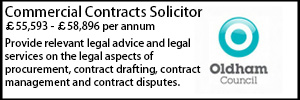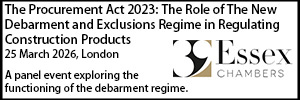Court of Appeal rejects appeal over finding that manifest error in procurement was not “sufficiently serious” for damages award
- Details
The Court of Appeal has upheld a High Court ruling that an error in the award of an NHS orthodontic contract was not sufficiently serious to entitle the claimant to Francovich damages.
Alexander Nissen KC, sitting as a Deputy High Court judge, had found in November 2023 that the contracting authority, NHS England, had committed a manifest error of assessment in its scoring of the claimant’s tender and that, absent that error, Braceurself’s tender would have won.
However, in a subsequent damages judgment, Judge Nissen concluded in Braceurself Ltd v NHS England [2022] EWHC 2348 (TCC) that the NHS’s error had been excusable and the provision of public services was unaffected.
The damages claimed by Braceurself were the sum of £4.7m for loss of profit, bid costs of £26,500 and loss of goodwill, which was not separately quantified.
Judge Nissen dismissed Braceurself's claim for damages, but granted it permission to appeal.
In Braceurself Ltd v NHS England (No 2 - Substantive Appeal) [2024] EWCA Civ 39 Lord Justice Coulson noted that in a public procurement claim, where an unsuccessful bidder claims damages against the contracting authority, the claimant must prove, not only a breach of the Public Contract Regulations 2015 ("PCR"), but also that the breach is 'sufficiently serious' to warrant an award of damages (sometimes called Francovich damages).
“Although this is a concept originating in European Law, it remains unamended by the new Procurement Act 2023. It is not a test that fits very easily either into the English common law generally, or the world of public procurement challenges in particular. This appeal is perhaps a paradigm example of some of the practical difficulties which the test can create,” the Court of Appeal judge said.
The primary issue in the appeal was whether, as a matter of principle, Judge Nissen’s finding that, but for NHS England’s breach, the appellant would have been awarded the contract "was decisive on the question of sufficient seriousness" (see paragraphs 26, 29 and 31 of the appellant's skeleton argument).
Lord Justice Coulson said: “This argument would, in many cases, mean that the effect of the breach automatically overrode any other factor. In addition, there are two further potential issues of principle in play, concerned with the culpability of the infringer and the principle of an effective remedy, which also arise from the 'sufficiently serious' test and the particular facts of this case. Still further, the respondent has raised, by way of a Respondent's Notice, a number of challenges to the core findings of the judge. There were therefore times during the hearing when it felt as if the entire litigation was being rerun on appeal. This risked obscuring the underlying issues of principle, which are not unimportant to those who practice in the public procurement field.”
Dismissing Braceurself’s appeal, the Court of Appeal judge rejected the two primary points of principle relied on by the appellant which he said “sought, in one way or another, to get away from the nature and quality of the breach of the PCR, and to focus instead on the consequences”.
He said he considered that Judge Nissen had carried out the balancing exercise in accordance with the applicable principles.
Lord Justice Coulson concluded that there was no incoherence or breach of the principle of effectiveness as alleged by the appellant, “and therefore no way round the application of the second Francovich condition”.
He also allowed the first point in the NHS England’s notice and found that the judge erred in attaching legal significance to a misunderstanding about the stair climber/stair lift and/or failing to note that the underlying concerns about access were both valid and made in the contemporaneous documents. It was more likely than not that, but for those errors, the judge would have retained the score the marking of the appellant's bid concerned accessibility of premises.
Lord Justice Dingemans and Lord Justice Snowden agreed.
Sponsored articles
Walker Morris supports Tower Hamlets Council in first known Remediation Contribution Order application issued by local authority
Unlocking legal talent
Legal Officer
Senior Solicitor - Property
Locums
Poll
15-07-2026 11:00 am



















































